How to Create SEO Strategy to Grow Your Business?
Author: Team WH
Published On: 25-05-23
Last Updated on: 25-09-23
Estimated reading time: 8 minutes
There are many elements you should focus on to ensure the success of your business in the current digital landscape. One of these includes generating organic traffic for your website, which you can accomplish with search engine optimization SEO. But how to create SEO strategy for your business?
In this blog, we will explain what an SEO strategy means, how it helps to rank your website on search engines, and some of the tried and tested SEO strategies. So, dive in right away!
What is SEO Strategy?

When you ask how to create SEO strategy for your business, the first question to consider is what it actually is. An SEO strategy is a well-defined method to bring more organic traffic to your website and improve site rankings on search engine result pages SERPs by planning and creating the website content in a certain way.
Unorganized content leads to poor indexing of the website by search engine bots, which affects the ranking factor of the website pages. With an SEO strategy, you can ensure that your content marketing efforts are not going to waste and you are creating content that your audiences are looking for. It specifies how your content will come across on SERPs.
What Does an SEO Strategy Look Like?
75% of people don’t look beyond the first page of the search engine. This means if brands don’t rank at the top of SERPs, they’ll miss out on valuable traffic, leads, and revenue for their business. Thankfully, with a robust SEO strategy, one can rank at the top of results pages and drive valuable traffic towards their website.
In this section, we’ll define an SEO strategy in practice by defining its critical components.
Relevant, Long-Tail Keywords
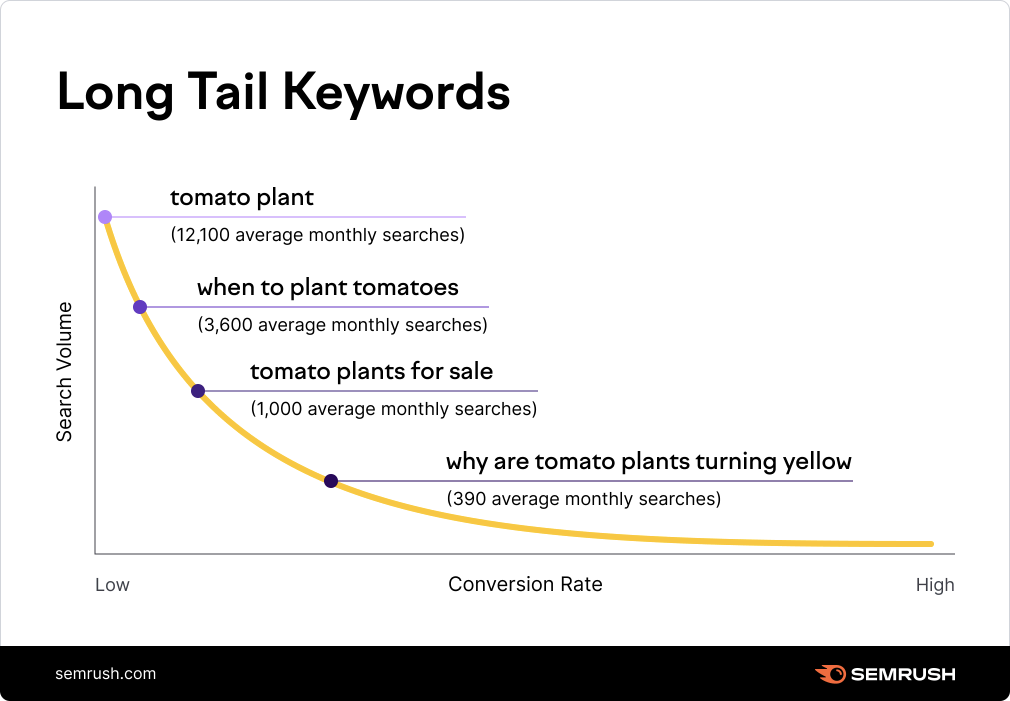
As mentioned, keyword is an integral part of an SEO strategy to improve visibility online. Incorporating relevant, long-tail keywords in your content is even more essential.
Long-tail keywords contain three or more words, like “best marketing agency in Bangalore.” When people search long-tail keywords, you can better distinguish their search intent – understand exactly what they’re looking for.
Contrarily, when someone searches “marketing,” they could search for a couple of different things, like marketing types, marketing services or marketing jobs. So, by targeting long-tail keywords, you can connect with qualified prospects who are most likely to convert.
Fast-Loading Website
Visitors expect a website to load in three seconds or probably less – and when it doesn’t, they leave. Moreover, Google, in 2018, started considering page speed for SERP ranking, making it a vital area of focus when you enact your SEO strategy.
When users visit your site, it should load quickly and be easy to navigate through the site and visit different pages.
Rei is an excellent SEO strategy example with a fast-loading website. They have done a fantastic job with their website, which loads in a mere 1.07 seconds.
Local SEO
Local SEO is critical for reaching valuable leads in your business location. An effective local SEO strategy will help your local business rank for area-specific search queries. It is of prime importance for businesses that rely specifically on foot traffic and local demand.
By ensuring you have a Google Business Profile and keeping your company contact information consistent across channels, you’ll be able to reach more interested leads for your business in your area.
Check the image below of a SERP result page for an electrician in Boston. The three businesses that appear in the results are good local SEO strategy examples. They have an optimised Google My Business profile with relevant information that helps it surface in results for Boston-area electricians.
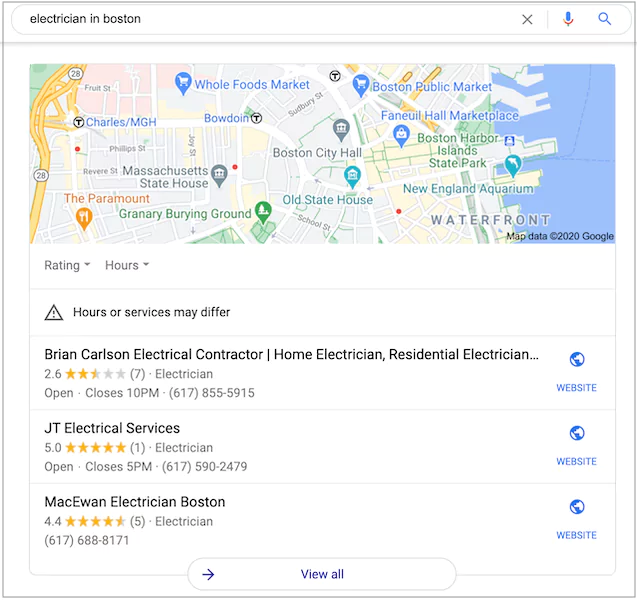
What are the Steps to Successful SEO?
Now we know why an SEO action plan is needed to improve your digital marketing success rates. So how to build SEO strategy? Let us explore some crucial SEO steps.
Set SEO Goals
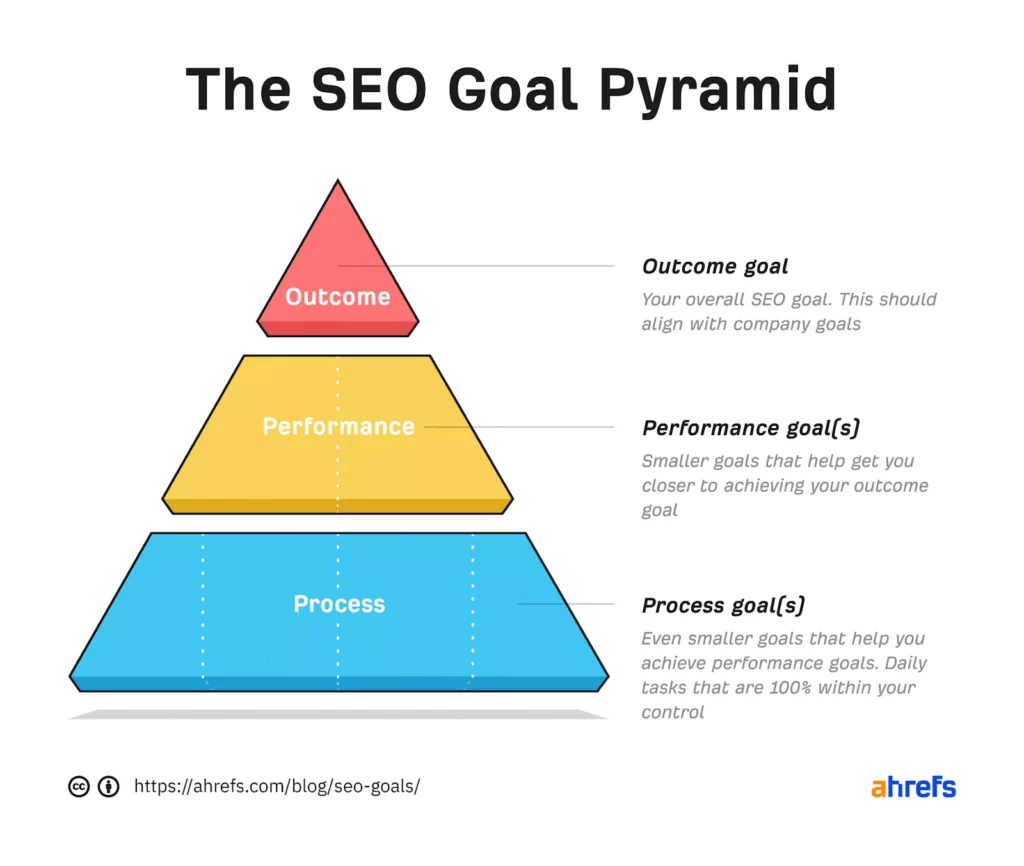
Here’s the first step to successful SEO.
Defining your goals before initiating an SEO plan is crucial to your marketing efforts. Setting clear goals will help you analyze revenue outcomes. Start by asking what is the purpose of your SEO strategy. Do you wish to increase sales or get more traffic? Is your objective growing reach within distinct audience segments? What are your expected conversion rates? And so on.
Perform Competitive Analysis
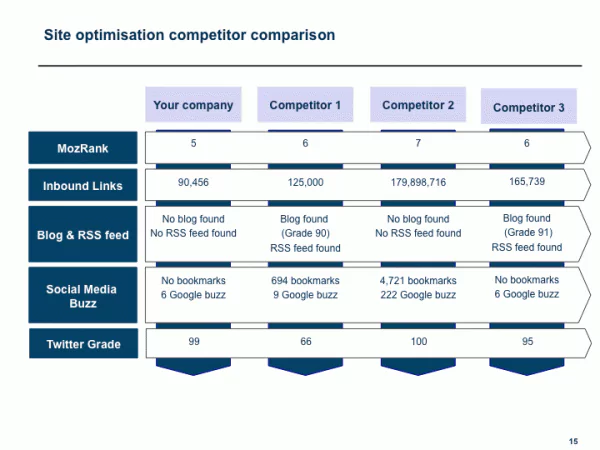
The sole objective of SEO is to surpass your competitors. To do that, you have to track your competition. Find out which keywords they are using, their backlinking and website structure, and more.
This way you already know what is working for them and what target keywords you should optimize your site for in order to achieve better rankings.
Researching your competitor strategies will help you:
- Identify their shortcomings and avoid those on your website.
- Build a plan by analyzing their strengths.
- Identify the essential SEO tasks.
Conduct Keyword Research and Create Topic Clusters

Looking for the right keywords is fundamental to an effective SEO strategy. Identifying what your audiences wish to read and building content around sought-after topics is the key to a successful online strategy.
One common mistake brands make is overproducing content without targeting keywords or using the same terms on repeat mode. Keyword research helps you cover vast topics relevant to the reader and attain better engagement, traffic, and SEO returns.
Use a keyword research tool like Google keyword planner, KWfinder, and more to organize valuable keywords based on search volume and relevance.
Plan For User Experience & Technical SEO
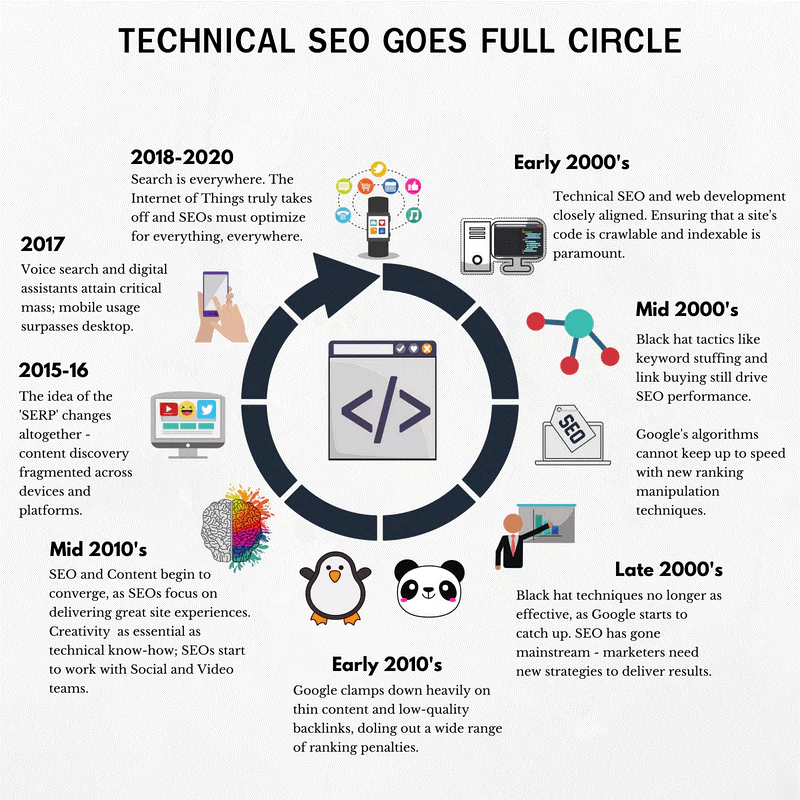
No amount of content and keyword research can help you boost sales if your website is not technically sound. A good site structure and a seamless user experience are essential to ensure that your visitors take the expected actions.
Technical issues like bad site structure, broken links, and slow load time can impact user experience, website crawling, and link distribution. Even if your content is worthy, Google’s algorithm might not allow your pages to rank.
Therefore, a concrete technical structure, along with good content and proper link building, is essential to ranking high in organic search results.
Unique Meta Title and Description to Boost CTR
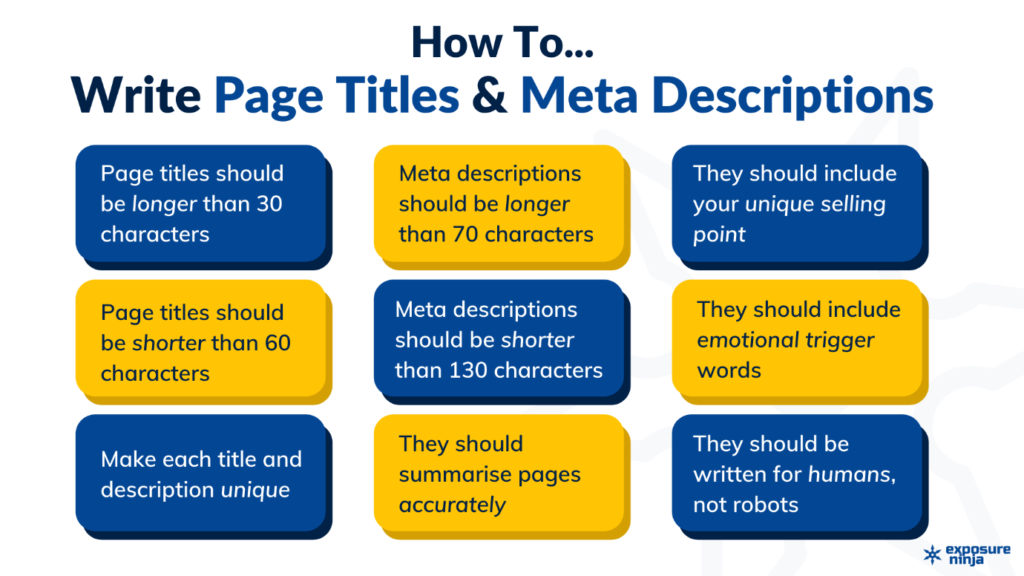
It is essential to stand out from the crowd on SERPs to enhance your CTR. You might rank high on SERP, but your meta title and description should be powerful enough for the visitors to click on your website URL.
Poor ranking results in diminished visibility, but not getting clicks even after ranking will prompt Google to deduce that your website is not relevant to the visitors.
Analyze the content of Google’s first result page for your targeted keywords. See how you can make your website URL stand out with a more compelling meta title and description.
Create High-Quality Content
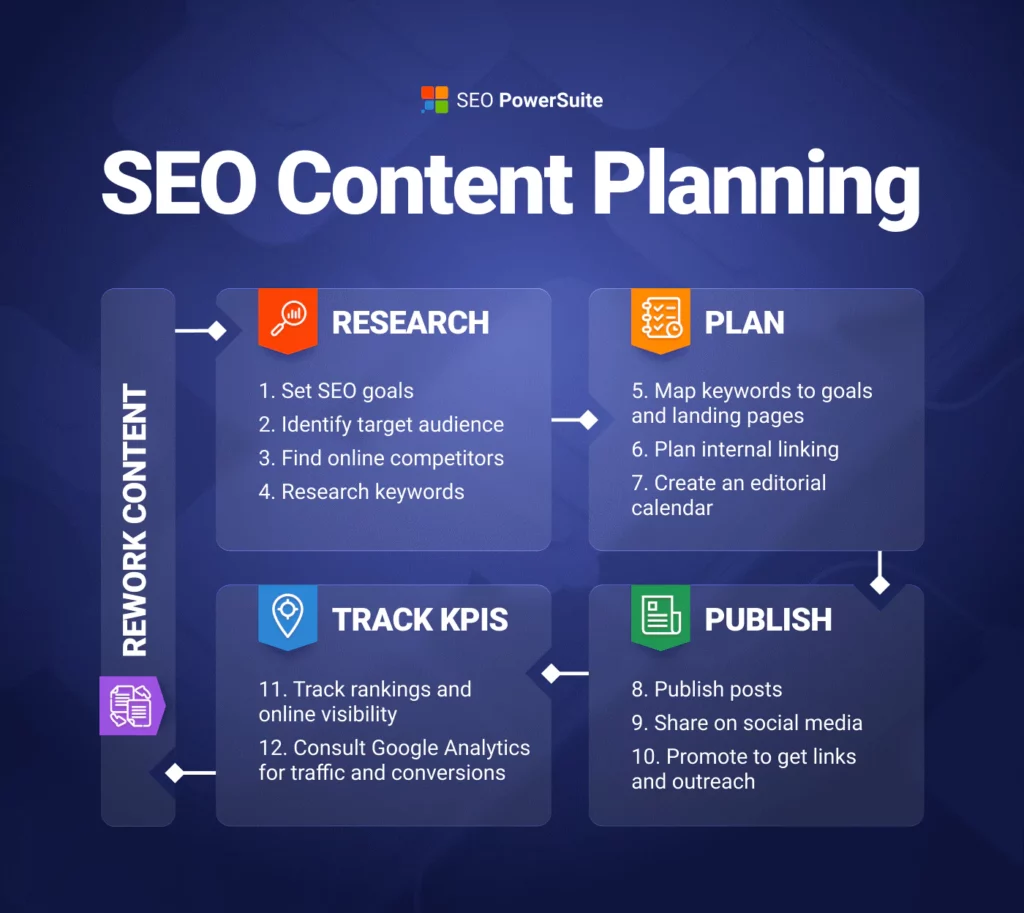
Create SEO content that is valuable and noteworthy to your target audience. This includes content that answers crucial buyer questions, presents valuable insights, and educates them about what to do next.
Research trending topics and the type of content that will appeal to the audiences and help the website rank better, like articles, blog posts, product pages, and more. Don’t forget to use the relevant keywords you have assembled with great research. However, make sure not to overstuff the keywords and use long tail keywords for better chances of ranking.
Take Care of On-Page SEO

You can’t earn better website rankings if you do not optimize your pages for on-page SEO.
To optimize for on-page SEO, you must consider the meta title and description tags, H1, subheads, URL structure, internal linking, and more. Make sure you’re using your target keyword in the right places across the web page. Also, ensure that all your web pages are well-connected with each other to support easy navigation for both users and search engines.
Develop a Link-Building Plan

Link building is central to off-page SEO and among the crucial SEO techniques in digital marketing. You cannot surpass reputable websites present on the SERPs with the content alone. To outrank your competitors, you will require backlinks from other authoritative websites.
Apart from your content quality and on-page SEO efforts, Google also considers how other domains consider your website. When reputed websites refer to your website on their web pages, their credibility adds to your site’s trustworthiness factor, enhancing your ranking ability.
Publishing guest blog posts is an excellent way to acquire backlinks.
Wrapping Up
SEO is not an easy task but a crucial one that can generate high ROI for your business. The above tips outline how to create SEO strategy for your business in an easily doable way. Once your website starts ranking on the SERPs, you will start witnessing a sizeable number of organic visitors on a daily basis.
Remember that SEO is a continuous process. You must keep evaluating and updating your existing content and refining your SEO content strategy to stay relevant.
Frequently Asked Questions
1. What are some of the most popular SEO tactics?
On-page SEO, thorough keyword research, getting backlinks, etc, are some of the widely used SEO strategies to help a website rank well.
2. What is the key to successful SEO?
Performing keyword research is the foundation of SEO. Finding the right keywords and building your content around them will help you rank on the SERPs.
3. Which keywords are best to target for SEO?
For businesses that are just starting, using long-tail keywords works best. These are usually four-plus words long and have a lesser keyword difficulty level compared to shorter keywords.
4. How much does SEO cost for a small business?
SEO can help small businesses improve online visibility and increase the number of visitors to their store or website. SEO charges in India typically vary between INR 5,000 – 25,000 per month, depending on the company or SEO specialist. A company with strong experience and expertise will probably charge more but can deliver excellent results.























































































































